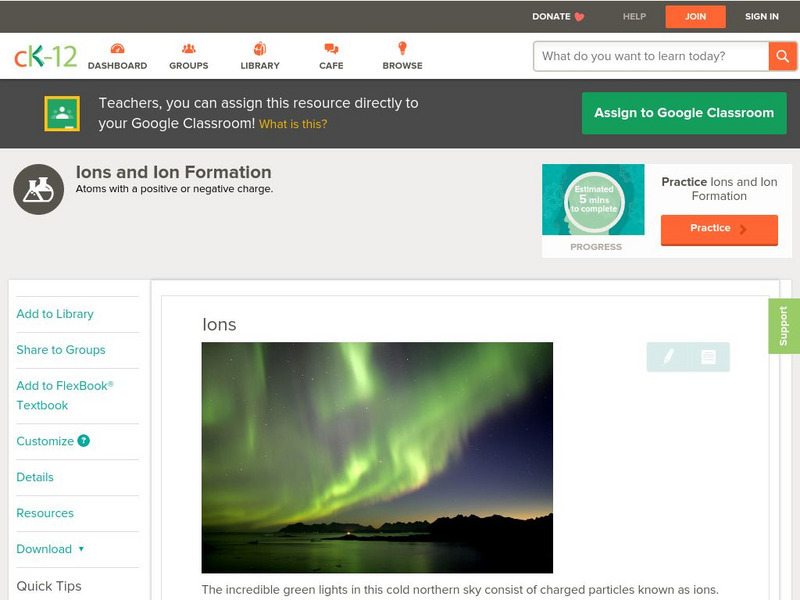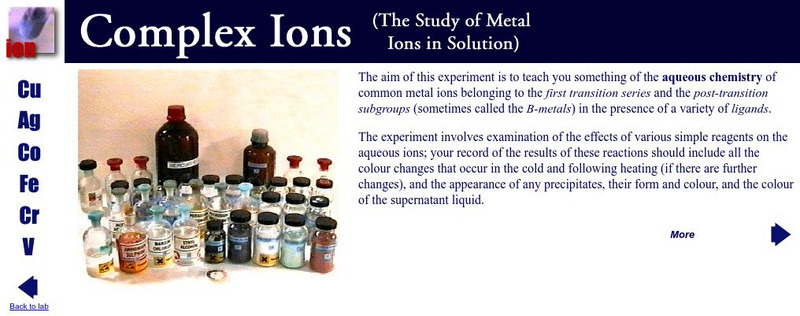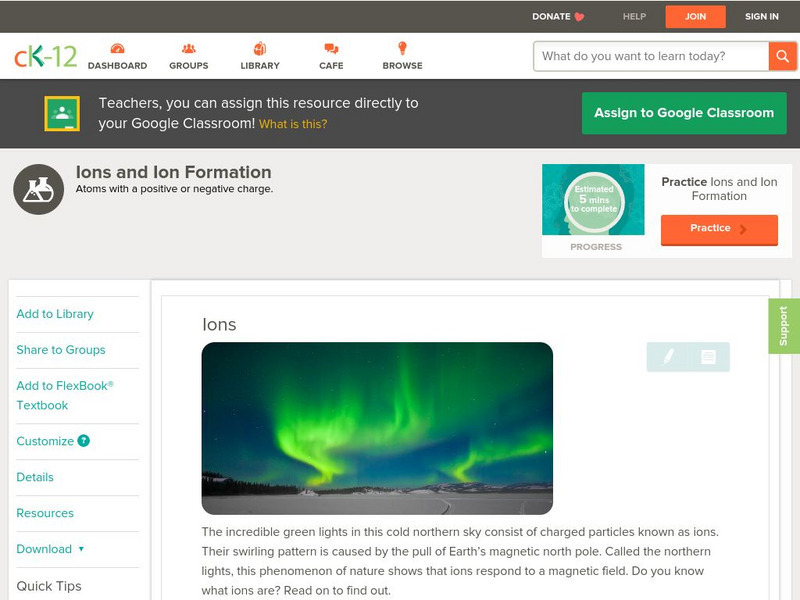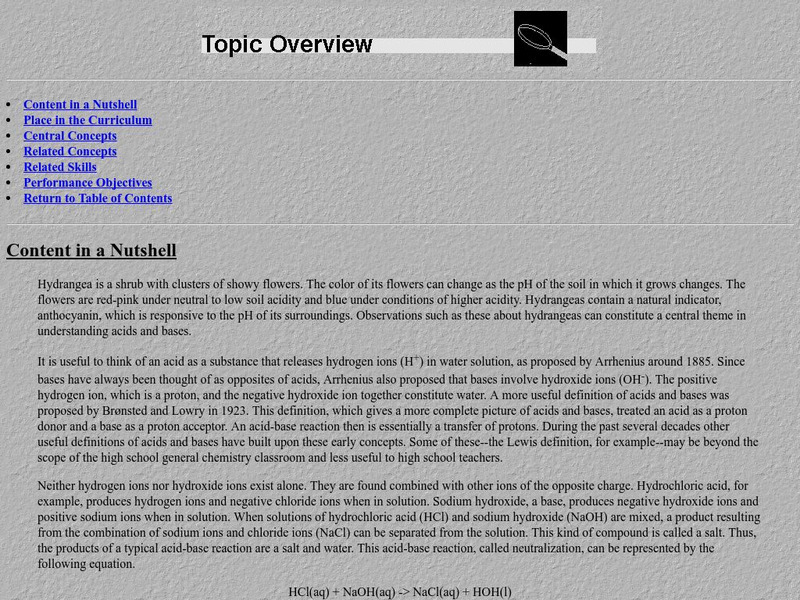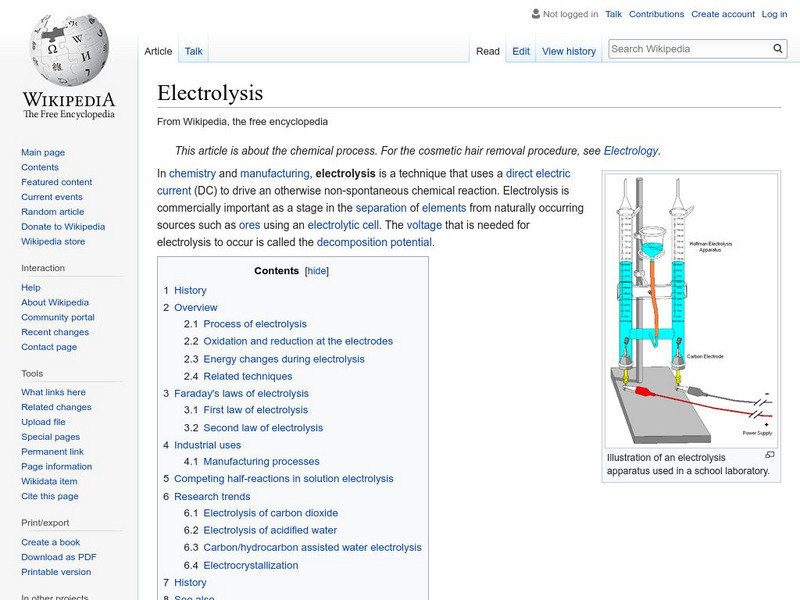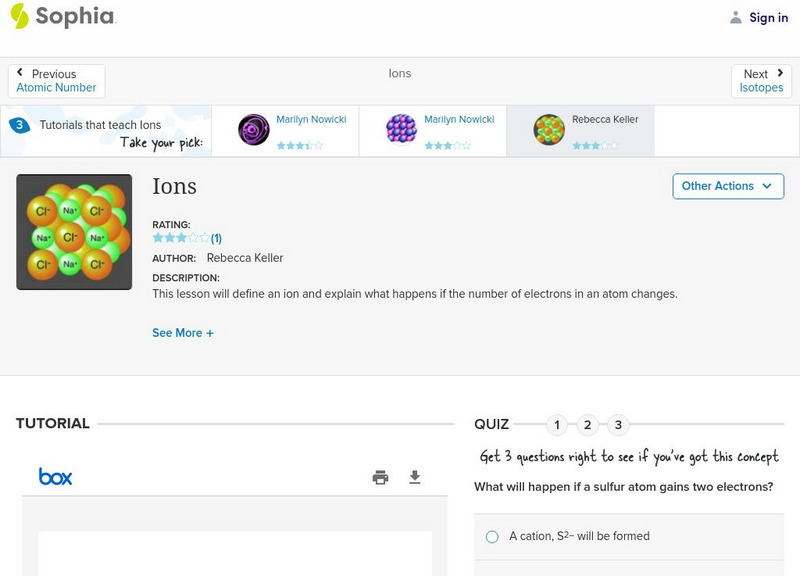Clackamas Community College
Clackamas Community College: Polyatomic Ions
Clackamas Community College provides a great explanation of how polyatomic ions form. This page uses Lewis dot notation to explain polyatomics, and several practice problems are provided.
CK-12 Foundation
Ck 12: Physical Science: Ions
[Free Registration/Login may be required to access all resource tools.] Ions, how they form and their properties.
CK-12 Foundation
Ck 12: Plix: Solute and Solvent
[Free Registration/Login Required] While paying attention to the charges, move the salt ions and water molecules around to simulate how salt ions are dissolved in water.
CK-12 Foundation
Ck 12: Chemistry: Anions
[Free Registration/Login may be required to access all resource tools.] Covers anion, anion formation, and anion nomenclature.
CK-12 Foundation
Ck 12: Physical Science: Plasma
[Free Registration/Login may be required to access all resource tools.] Properties of matter in the plasma state and where plasma is found.
University of Waterloo (Canada)
University of Waterloo: Ionic Compounds
Discussion of ionic compounds includes monatomic and polyatomic ions, lattice energy calculations, and practice questions.
University of Oxford (UK)
Complex Ions: The Study of Metal Ions in Solution
This site provides examples of ionization with the use of Quicktime video clips.
BBC
Bbc: Gcse Bitesize: Electrolysis
This lesson focuses on Electrolysis, the decomposition of a liquid using electricity. When ionic compounds are molten or dissolved in water the ions are free to move. It offers links to a video and a test.
Other
Brinkster: All About Ionic Compounds
This site describes the various properties of ionic compounds, how they are named, and an easy method for naming them.
CK-12 Foundation
Ck 12: Physical Science: Ions
[Free Registration/Login may be required to access all resource tools.] A learning tutorial about ions, how they form and their properties.
Alabama Learning Exchange
Alex: Rolling, Rolling, Rolling
This activity allows young scholars to review their knowledge of monatomic and polyatomic ions. After rolling the ion dice, the students will write the correct chemical formula and name for the compound "rolled".This lesson plan was...
Lawrence Berkeley National Laboratory
Berkeley Lab: Linear
Use this site to learn about the invention of the linear accelerator and how it works.
University of Sydney (Australia)
Ionospheric Physics: Photoionization
Defines photoionization analytically, describing it in terms of formulas. Contains links to other sites related to atmospheric/ionospheric physics.
Oklahoma State University
Oklahoma State University: Acid Base Overview
Beginning with the example of the hydrangea, this page gives a good overview of acid-base chemistry.
Wikimedia
Wikipedia: Electrolysis
Wikipedia offers a short explanation of the how the electrolysis process works with links to some of the scientific pioneers of electrolysis.
NASA
Nasa: La Exploracion De La Magnetosfera Terrestre
This site is a general overview of space research on the environment of the Earth in space.
Other
Perspectives on Plasmas: The Fourth State of Matter
An educational website dealing with all aspects of the fourth state of matter, Plasma. The site deals with basics, applications and resources. The site also includes a gallery of pictures of plasma.
Other
Atoms in Motion: Atoms and Ions
All matter is made of atoms! And atoms are made of even smaller more fundamental particles. Atoms are not shiny little rigid spheres as we depict in drawings and simulations; they're more like a squishy storm of tiny particles swirling...
Other
Fernbank: Review of Ionic Charges
At this site from Fernbank you can become a pro by practicing them with this review game.
Sophia Learning
Sophia: Ions: Lesson 2
This lesson will define an ion and explain what happens if the number of electrons in an atom changes. It is 2 of 3 in the series titled "Ions."
Sophia Learning
Sophia: Atoms: Lesson 3
This lesson will provide an understanding of the basic chemistry of atoms. It is 3 of 5 in the series titled "Atoms."
Sophia Learning
Sophia: Atoms: Lesson 4
This lesson will provide an understanding of the basic chemistry of atoms. It is 4 of 5 in the series titled "Atoms."
Sophia Learning
Sophia: Atoms: Lesson 5
This lesson will provide an understanding of the basic chemistry of atoms. It is 5 of 5 in the series titled "Atoms."



